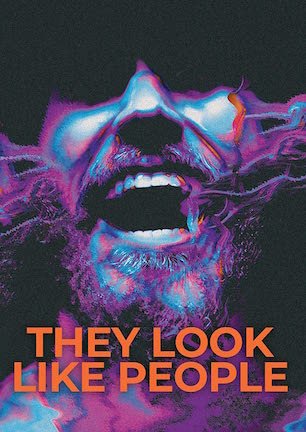Studio: Gravitas Ventures
Director: Perry Blackshear
Writer: Perry Blackshear
Producer: Perry Blackshear, Evan Dumouchel, MacLeod Andrews, Kimberly Parker
Stars: MacLeod Andrews, Evan Dumouchel, Margaret Ying Drake, Mick Casale, Elena Greenlee
Review Score:
Summary:
Two men have their friendship tested when one of them begins secretly suspecting that people are transforming into imposters.
Review:
Playing the “it’s like (movie x) meets (movie y)” game is a challenge with “They Look Like People.” In considering films with feels that might be analogous, the flawed friendship dynamic of an indie effort like “Resolution” (review here) comes to mind first. The microbudget mood of “Primer” springs up next. The scaled-down simplicity of “Creep” (review here) also enters the mix. Given its “invaders among us” content and DIY style, perhaps the best way to describe “They Look Like People” with a simple comparison is: Think “They Live” reimagined as mumblecore.
It’s been years since formerly close buddies Wyatt and Christian didn’t need the word “formerly” to describe their friendship. Both men are rebuilding individual identities following failed romances, although each of them is coping in a radically different way. Christian uses daily affirmations recorded by his ex for mustering courage to date his boss Mara while Wyatt’s mental restructuring mounts towards much higher stakes.
Following a suspiciously chance reunion on a New York sidewalk, Wyatt ends up inflating Christian’s air mattress and the men pick up where they left off when life was less complicated, shooting hoops, shooting the breeze, and acting like kids again with playful sock fights. At night is when things get weird. That’s when Wyatt takes phone calls from a mysterious voice reminding him that war is coming. Humans are being secretly infected and assimilated, and the monsters are so deceptive that there is no way to tell who is who.
Wyatt is one of the chosen who can supposedly see people for who they are. He wants to save Christian if he can, but convincing anyone of a conspiracy this wild is a delicate matter. Unsure who he can trust while his preparations are made, Wyatt is soon to be exposed as either madman or messiah as the deadline for battle approaches.
When it comes to paranoid protagonists in psychological suspense, it is always a sure bet that no matter how outrageous the rant, it will always be proven right. Has a shocking scheme been uncovered or is this person merely an unstable lunatic? Horror movies rarely succeed in painting that latter option as a true possibility. The audience knows if aliens have supposedly infiltrated or clandestine evil is afoot, it is merely a matter of waiting until the climax for everyone else to learn what the misunderstood hero already knows.
Except in this instance. “They Look Like People” is one of the rare paranoid thrillers where both possibilities are always equally in play. Throughout the entire film, the seesaw determining the outcome remains expertly balanced in a way where any guess for how the film will conclude never has better than a 50/50 chance of being correct.
A key reason for that is because “They Look Like People” is more than mere entertainment, and whether or not Wyatt is right about the infection is not the pivotal element of the story. He and Christian are both dealing with uncertainty over who the other person is, and coming to terms with that truth makes “They Look Like People” an intense exploration of their friendship dynamic at its thematic core. Dissecting this kind of subtext is not at all necessary for enjoying the film as traditional suspense, but there is a considerable amount of commentary within the characters for anyone interested in examining the movie as a relationship study.
Boiled down, “They Look Like People” is essentially actors MacLeod Andrews and Evan Dumouchel workshopping natural interactions with one another and fashioning a compelling story as much from performance as from what is on writer/director Perry Blackshear’s page. This makes the film additionally rare in that it is one of a very small number of experimental microbudget features where the experiment yields successful results. “They Look Like People” is definitely not a mainstream movie, but labeling its aesthetic as arthouse isn’t quite accurate, either. Its atmosphere always has a simple hint of perpetual danger, but pinpointing exactly what feels unsafe is difficult to do.
“They Look Like People” is a terrific template for independent filmmakers to use as an example of producing effective atmosphere and subtle intensity inexpensively. Maintaining the mystery requires not showing any infected human transformations so the viewer can continue doubting Wyatt’s sanity. For a pod people movie without the budget for elaborate effects, making that conceit an essential part of the fiction is a brilliant filmmaking move.
The style might be too simple for some to sink teeth into and others may be disinterested in a treatise on self-realization. But outstandingly organic performances from MacLeod Andrews and Evan Dumouchel as the leads and Margaret Ying Drake in support keep frightening fascination at a high level. Calm and intelligent, the film treats its material seriously, with mental illness regarded as something more significant than a plot device. “They Look Like People” is a compelling character piece presented as paranoid suspense, and this brand of uniqueness is difficult to find in genre films.
Review Score: 85






“Primate” has so much self-aware confidence in its go-for-the-throat style that the film wears its B-movie badges proudly.